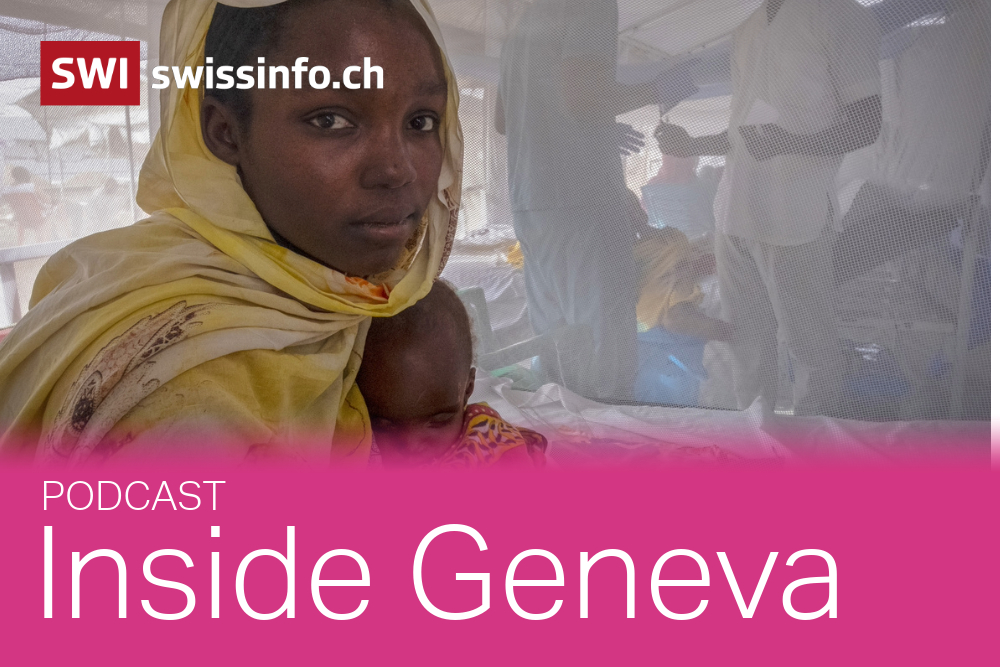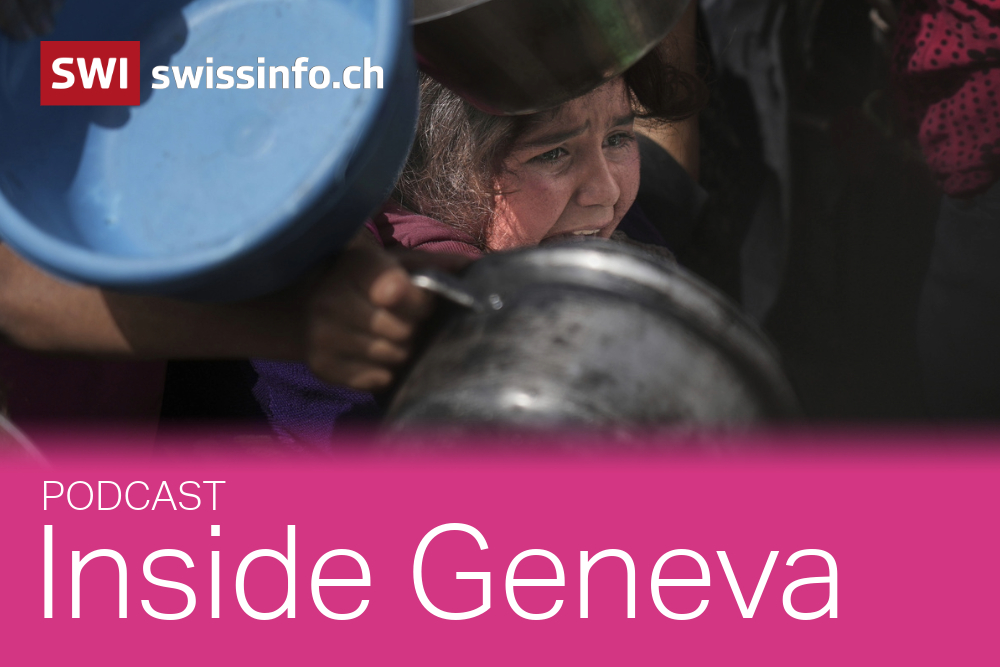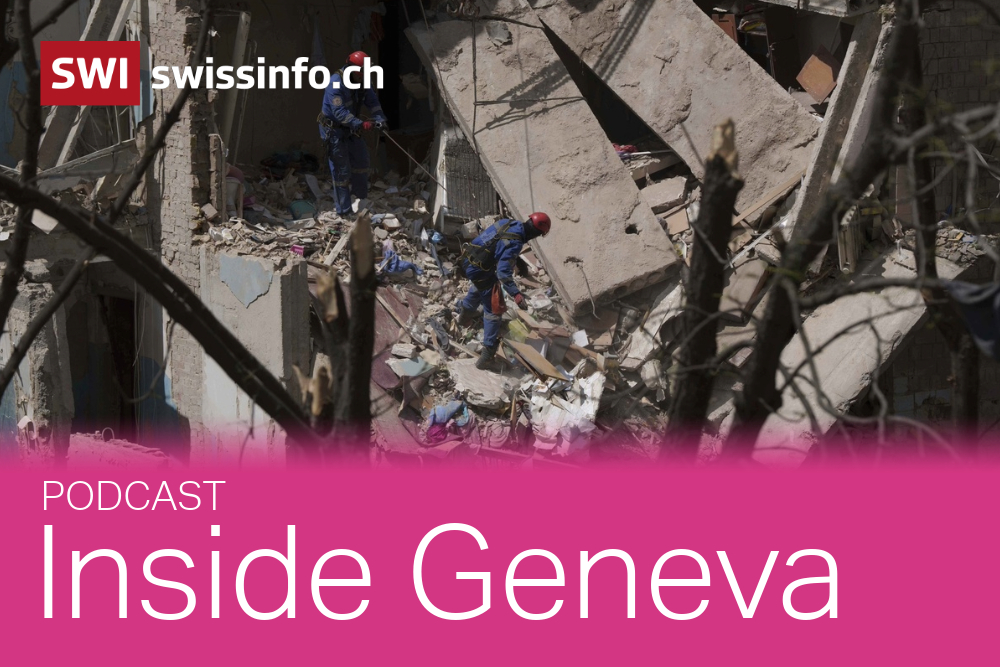
2025 – a dizzying, momentous year so far
Over the past week or so, I’ve had all sorts of cliches and snatches of songs running round in my head; "what fresh hell can this be?", for example, a remark the 1920s writer Dorothy Parker used to make when her doorbell rang.
It’s fair to say that 2025 so far has been momentous, and not in a good way. Over the course of this year we’ve tried to bring you some analysis of that on Inside Geneva, from a look at the savage cuts to aid agencies and to the prospects for a fair, sustainable peace in Ukraine and the bloody consequences of blocking the United Nations in Gaza, and replacing it with the inexperienced and ill thought out Gaza Humanitarian Foundation.

More
US-Russia talks on Ukraine: peace or appeasement?

More
Inside Geneva: women, girls and cuts to humanitarian aid

More
Inside Geneva: the failed militarization of humanitarian relief in Gaza
In this week’s podcast I’m joined by journalists Nick Cumming-Bruce and Gunilla von Hall to try to pull some of these issues together, and analyse the year so far. Cumming-Bruce a regular contributor on Geneva topics for the New York Times, sums up the long term damage of the cuts to humanitarian aid.
“What is disturbing is the very casual destruction of international institutions and agreements that have been pulled together over many years, decades of works since World War II”, he tells Inside Geneva. “For all their many imperfections they are trying, with some cases significant success, to address the critical challenges that the world faces.”

More
War, peace, and cake: the world in 2025
The aid cuts, he continues, will cause many deaths in remote, crisis stricken parts of the world, deaths that in many cases will no longer even be recorded. But, he argues, it is time now for other countries to chip in with funding. For decades, humanitarian aid has been mostly paid for “by a small handful of western countries”, with the United States, although not paying as much proportionately as smaller European nations, paying by far the most in pure cash terms.
“Where is China, the world’s second largest economy?” Cumming-Bruce asks, “Or India, or Singapore?”. These thriving economies, he points out, contribute little to humanitarian aid, and when they do, it’s often bilateral rather than through the UN system. So, with the multilateral system under enormous strain, surely it’s time for these countries, if they believe in that system, to step up?
January 20 turning point
But aid cuts are not the only events shaking up international Geneva. There has been the US pull out of the World Health Organisation and the UN Human Rights Council, raising questions over its commitment to the UN altogether – which then in turn raises questions over the survival of the UN, if the world’s premier superpower isn’t engaged.
Should we pin all the upheaval on Washington, and the new Trump administration? von Hall, Geneva based journalist with Swedish newspaper Svenskadagbladet, does see some very negative patterns.
‘‘It all started downhill from 20th of January” she tells Inside Geneva. “The Ukraine war will be over in 24 hours? Nothing happened. It just got worse. Then we had Gaza, then we have Iran, Israel. Then we had the cuts of all the aid. It’s very bleak. I think we should just not give up our hope, but it looks really…well, we’ve got four years.”
Von Hall’s point about the Russia Ukraine war tells us quite a lot about the challenges to the UN, and the multilateral system. The US decided to bypass all traditional diplomatic practice, not seeking UN support, not talking with its European allies, not even really talking to Ukraine, but instead going straight to Moscow to talk to Vladimir Putin, the man who ordered the invasion of Ukraine. The result? Nothing, except increased Russian bombing of Ukrainian cities.
Later in the year, when Israel walked away from the ceasefire in Gaza, and imposed a ten week long aid blockade on Gaza, we saw another example of the UN being by-passed, and another reason that might not be the best idea.
The Gaza Humanitarian Foundation, set up by the US and Israel, was, Donald Trump said “to help the people of Gaza get some food”. In fact, its limited aid distribution points have forced starving people to walk long distances through conflict zones. Hundreds have been shot, and, while the Israeli army largely denies responsibility, as Cumming-Bruce points out “when you’re talking about tank fire, drone fire, fire from even naval vessels at these kinds of gatherings of people, there’s very little doubt how the great majority of these casualties are being caused.”
And, as Chris Lockyear, Secretary General of Médecins Sans Frontières (MSF ) or Doctors without Borders told us in an earlier podcast, delivering aid “is not child’s play. It is not a military operation. It is a different thing that requires years and decades of experience.”
Whiplash
As I write this, a ceasefire between Iran and Israel, proudly announced by the US just hours ago, appears to have unravelled. And that’s just three days after the US bombed Iran’s nuclear facilities, and twelve days after Israel launched its attacks on Iran.
“Whiplash”, as one colleague commented, “doesn’t even begin to describe it.” It’s more than possible, likely even, that things will have changed again before this article is published. That’s the nature of 2025, momentous, volatile, unpredictable, and very dangerous.
But our Inside Geneva discussion does end on a slightly more hopeful note. Von Hall thinks that sooner or later there will be a return to the common sense of the negotiating table. Meanwhile, the aid agencies, many of whose representatives we have interviewed this year on the podcast, are not giving up. Their funds are painfully reduced, but they are still working; in Sudan, Yemen, Afghanistan, DRC, Gaza, Ukraine, and many more places.
Hard though it is, we have to hang on to something positive, and right now, those humanitarian standards and values, the international law we all agreed on after the second world war, are those positive things – so hold them tight!
Edited by Virginie Mangin

In compliance with the JTI standards
More: SWI swissinfo.ch certified by the Journalism Trust Initiative






























You can find an overview of ongoing debates with our journalists here . Please join us!
If you want to start a conversation about a topic raised in this article or want to report factual errors, email us at english@swissinfo.ch.